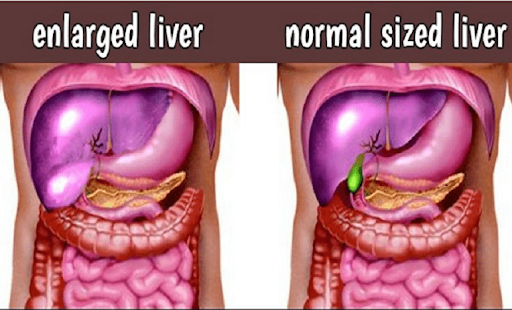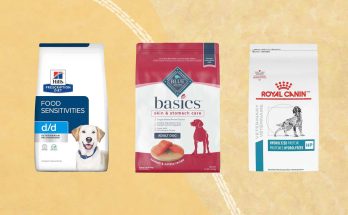One of the most essential organs in the body, the liver processes nutrition, eliminates toxic chemicals, and makes needed proteins. A health problem that requires care may be present if the liver enlarges. Hepatomegaly, or enlarged liver, can be brought on by several things, including drinking alcohol, viral infections, and fatty liver disease. In this thorough guide, we’ll concentrate on different foods to avoid with enlarged liver suffering, diet-related aspects of treating an enlarged liver and investigate items to steer clear of to support liver health.
Table of Contents
What do you Understand by an Enlarged Liver?
Understanding what an enlarged liver is and how it can impact your health is crucial before delving into the specific foods to avoid. The liver is an organ that performs many processes, like removing toxins from the blood, metabolizing food, and creating critical proteins. When the liver swells, it may indicate that something deeper requires treatment.
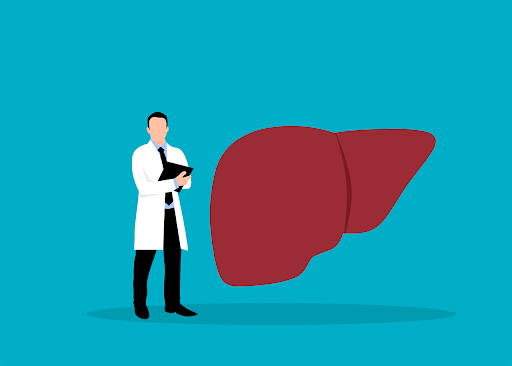
Excessive alcohol use, non-alcoholic fatty liver disease (NAFLD), viral hepatitis, and certain drugs are common reasons for an enlarged liver. Identifying the cause of hepatomegaly is critical because the underlying ailment may affect the recommended course of treatment and nutrition.
What are the causes of an enlarged liver?
Numerous underlying medical disorders can result in hepatomegaly, the term for an enlarged liver. Finding the underlying cause of hepatomegaly is crucial since it will help identify the best course of treatment and management. The following are some typical reasons for an enlarged liver:
- Non-Alcoholic Fatty Liver Disease (NAFLD): NAFLD is distinguished by the buildup of fat in the liver, not brought on by alcohol. It frequently goes hand in hand with metabolic syndrome, insulin resistance, and obesity.
- Hepatitis: Viral liver infections (including hepatitis B, C, and A) can inflame the liver and result in hepatomegaly. If neglected, chronic hepatitis infections can result in cirrhosis.
- Cirrhosis: Cirrhosis is a late stage of liver scarring (fibrosis) brought on by chronic liver injury, frequently brought on by illnesses like alcoholism, viral hepatitis, or NAFLD.
- Hemochromatosis: This inherited condition causes an excessive deposit of iron throughout the body, including the liver, which damages and enlarges the organ.
- Wilson’s Disease: This uncommon hereditary illness results in copper buildup in the liver and other tissues, resulting in hepatomegaly and liver destruction.
- Autoimmune hepatitis: When the body’s immune system accidentally targets and harms the liver, it causes inflammation and liver enlargement.
- Medication: When used in excess or for an extended period, some medications, including antibiotics, antiepileptics, and over-the-counter pain relievers (like acetaminophen), can damage the liver and result in hepatomegaly.
- Infections: Some infections, such as mononucleosis (Epstein-Barr virus), cytomegalovirus (CMV), and several parasite diseases, can result in liver inflammation and enlargement.
- Congestive Heart Failure: When the heart cannot pump blood efficiently, the liver may get congested and expand.
- Cancer: Liver enlargement can be brought on by either liver or metastatic cancer (cancer that has spread to the liver from other body regions).
What are the foods to avoid with an enlarged liver?
Here are the list of foods which you should avoid in every circumstances:
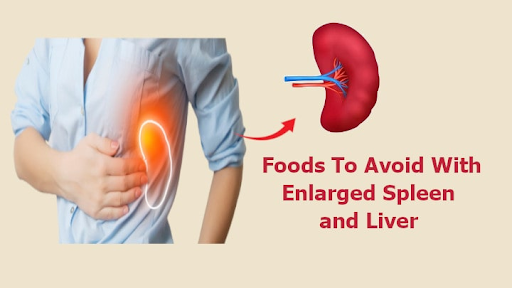
-
Alcohol
The most important dietary change you can make is to stop drinking alcohol entirely or significantly cut back if it is the cause of your enlarged liver. Alcohol abuse can harm liver cells and cause diseases like alcoholic liver disease. Giving up alcohol is the first and most crucial step in treating hepatomegaly because the liver requires time to repair.
-
Sugary Foods and Beverages
Foods and beverages with a lot of added sugars should be consumed in moderation or not at all. Increased weight, insulin resistance, and fatty liver disease can all result from excessive sugar consumption. The liver is particularly harmed by high-fructose corn syrup, frequently found in processed meals and sweet beverages.
-
Fried and high-fat foods
Non-alcoholic fatty liver disease (NAFLD) can develop and progress due to a diet high in saturated and trans fats. The perpetrators in this category are items cooked with hydrogenated oils, processed meats, and fried foods. They may cause the liver to accumulate fat and lose its ability to operate.
-
Sodium-rich Foods
Too much salt can cause the body’s organs, especially the liver, to expand and retain fluid. People with liver conditions should restrict their sodium consumption to prevent complications like ascites, a disease marked by abdominal fluid accumulation.
-
Red and Processed Meats
Red meats can cause liver inflammation and oxidative stress, mainly if they are processed or have a lot of fat. Preservatives and additives that harm the liver’s health are frequently found in processed meats like sausages, bacon, and deli meats. Choose lean protein options like tofu and beans and poultry, fish, and other plant-based options.
-
High-Caffeine Beverages
While modest amounts of caffeine are usually considered healthy for most individuals, excessive amounts can cause dehydration and put additional strain on the liver. Too much sugar, energy drinks, and other caffeinated beverages also put additional strain on the liver.
When it comes to caffeine usage, moderation is crucial. Limit your consumption of energy drinks, and think about making water or herbal teas your go-to beverage instead.
-
Vitamin A overdose
Although vitamin A is necessary for health, taking it in excess, frequently through supplements, can damage the liver. Follow suggested daily amounts, and talk to a doctor if you have questions about your vitamin A intake.
-
High-Iron meals
If you have a specific liver ailment like hemochromatosis, steer clear of high-iron meals like red meat and iron supplements. For specific advice on iron intake, speak with your healthcare professional.
What are some Liver-Friendly Foods?
Now let’s look at some meals that can promote the health and recovery of your liver:
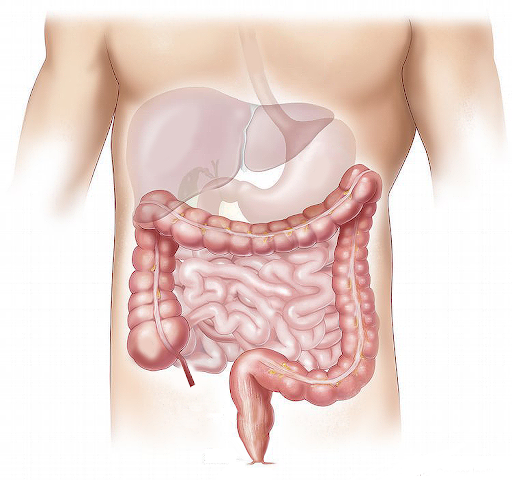
- Fruits and vegetables: These are full of vitamins, fiber, and antioxidants that can help lessen liver inflammation. Boost your diet with a variety of fruit and vegetable colors.
- Whole Grains: Whole grains provide carbohydrates and fiber, including oats, quinoa, and brown rice, without raising blood sugar levels.
- Lean Proteins: Opt for lean protein sources, including fish, poultry, tofu, and lentils. Your liver will have an easier time processing them.
- Nuts and seeds: They are good sources of antioxidants, healthy fats, and vital nutrients. Due to their high-calorie content, only eat them in moderation.
- Healthy Fats: Add food items like avocados, olive oil, and oily fish (e.g., salmon). These fats are suitable for your liver and general well-being.
- Herbal teas: Some herbal teas, like milk thistle and dandelion, are thought to enhance liver health. Before using herbal supplements in your diet, talk to your doctor.
- Low-Fat Dairy: Choose dairy products that are low-fat or fat-free so that you can get all the nutrients you need without getting too much-saturated fat.
Conclusion
In summary, an enlarged liver indicates that your liver requires assistance and is under depression or stress. You may significantly improve the health of your liver by avoiding foods that aggravate liver disease and choosing a diet full of foods that are good for your liver. To develop a customized nutrition plan catered to your unique condition and demands, you must speak with a medical expert or a licensed dietitian. Achieving long-term health necessitates treating the underlying cause of your liver enlargement; remember that dietary adjustments alone may not be adequate.

